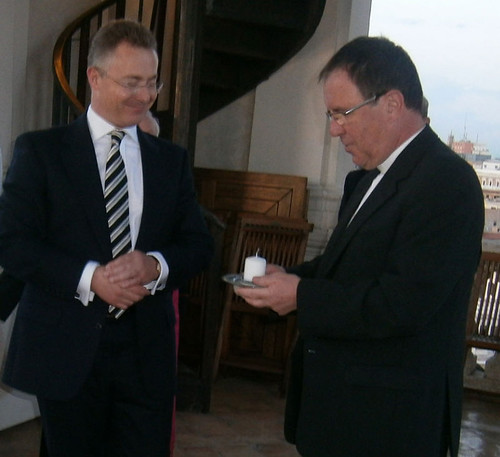
I am often asked whether my role as British Ambassador to the Holy See is to represent British Catholics. Or whether I have ex officio a particular relationship with the Catholic hierarchies of England and Wales, Scotland, and Ireland (at least, the Northern Ireland end). My reply is yes. I do represent the British government, and thereby British Catholics. And also Anglicans, Presbyterians, Sikhs, Muslims, Hindus, agnostics, atheists, Jews, Buddhists, and those of other faiths and none. Britain is a complex, pluralistic society. Its representatives must always take that into account.
Having said that, one particular aspect of the role of the Embassy to the Holy See, compared with our other Embassies elsewhere in the world, is that we do encounter religion in all its forms. The Pope is one of the principal world religious leaders, and it is no surprise that faith leaders and leaders with faith cut a path to his door. In the last few months this Embassy has had the privilege of facilitating visits to Rome by, amongst others, Tony Blair, the Chief Rabbi, the Archbishop of Canterbury, and Baroness Warsi. This weekend it was a pleasure to meet the Moderator of the General Assembly of the Church of Scotland, David Arnott, who was here for official calls on the Holy See and to meet the members of his Church in Rome.
The Church of Scotland has had a presence in Rome for 150 years. They are now based at St Andrews Church a stone’s throw from the residence of the President of Italy, though in 1862 they had to worship clandestinely for fear of persecution. I once asked the Church of Scotland Minister here, the Reverend Willie McCulloch, what the original mission had been. His smiling reply: “to convert Rome – and it is still work in progress”. What is impressive about their presence in Rome today is the multinational nature of their congregation. Scots, of course. But also Koreans, Ghanaians, Cameroonians, Italians, Americans and Kenyans.
Part of the international responsibility of the Holy See is its active engagement with people of other faiths and other Christian denominations. That engagement requires mutual understanding, respect, and recognition of different histories and experiences. I welcome British faith leaders like David Arnott to the Holy See, because every such visit is part of the global effort towards greater understanding across religious, ethnic and cultural divides. That is the bedrock of conflict prevention. It is important that the Holy See takes those efforts seriously.
